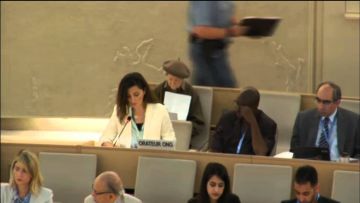The 7th meeting of the Abant Platform, one of the leading civil society initiatives in Turkey, opened in Washington, DC, on April 19, 2004. This marks the first time the Platform meeting has been held abroad.
Turkey is an example that shows [how] Islam and democracy can reconcile. And it is very important that this [Abant Platform] meeting was organized in the US while the issue is still popular.
Distinguished University of Wisconsin Professor Kemal Karpat
The theme of this year’s Abant Platform is “Islam, Democracy, and Secularism: The Turkish Experience.” This theme’s three components have gained considerable importance in Turkey ever since the September 11th attacks. Johns Hopkins University’s Paul H. Nitze School of Advanced International Studies (SAIS), one of the most prestigious schools for foreign policy, hosted the meeting. Turkey’s Journalists and Writers Foundation (JWF) also contributed to the meeting’s organization.
World-renowned Francis Fukuyama of SAIS gave the opening remarks. He said that a religious society did not have to conflict with the principles of democracy and secularism. He explained, “The US is one of the most religious societies in the West. However, this situation does not prevent the administration from being secular and democratic.” Fukuyama predicted that Turkey will be a model for the Islamic world, showing that one can be both Muslim and democratic, as has been the case for Turkey’s Justice and Development Party (AKP).
Bilgi University’s Professor Mete Tuncay also presented a few opening remarks, giving a brief overview of the Abant Platform and its mission. He discussed learning about the culture of compromise, which has been an issue for progressive and conservative groups in Turkey, by experiencing it through the Platform.
State Minister Mehmet Aydin, a former chair of the Platform, delivered the keynote speech. He emphasized the reconciliation of Islam and democracy, using Turkey as an example. Aydin argued that the Ottoman experience had been more efficient than people thought in Turkey’s democratization process. He said that foreign factors had just as much of an effect as internal factors during the modernization process from the Tanzimat (administrative reforms) Period to the European Union (EU) process.
Due to health problems, JWF Honorary President Fethullah Gulen could not attend the meeting. However, in a message he had sent, he wrote, “I sincerely believe that Turkish and American intellectuals will best analyze to what extent Turkey has achieved the goal of ‘being secular, democratic, and [representative of a] social state of law’ as a country populated mostly by Muslim people, and how deficiencies, if there are any, will be remedied.”
Gulen also referred to Ataturk’s principles of ‘modern civilization’ and ‘peace at home, peace in the world.’ Gulen mentioned that brainstorming during the meeting would not only contribute to presenting Turkey’s experience more clearly, but would also shed light on other countries where Islam is the primary religion. Drawing on this idea, the Platform’s Board of Trustees President, Huseyin Gulerce, stated that one of the goals of the Abant Platform in Washington was to deliver messages to the US about the region as it makes preparations for the Greater Middle East Project.
Distinguished University of Wisconsin Professor Kemal Karpat, one of the resident attendees of the Platform’s meetings, emphasized that organizing Abant abroad was important. He explained, “Turkey is an example that shows [how] Islam and democracy can reconcile. And it is very important that this meeting was organized in the US while the issue is still popular.”
During the first day of the two-day meeting, experts presented papers in three different panels. Each panel dealt with Turkey’s experience with one of the three major topics of the conference: Islam, democracy, and secularism.
A series of round table meetings also took place today. Most of those discussions involved determining the applicability of Turkey’s experience to other countries in the Middle East, Central Asia, and the Caucasus. In addition, State Minister Ali Babacan and the Republican People’s Party (CHP) Deputy Kemal Dervis delivered speeches at the meeting.
About the Abant Platform
Scientists and intellectuals from diverse groups have met every year since 1998 as part of the Abant Platform. The Platform tries to generate solutions within the frame of universal values by discussing Turkey’s social and cultural issues. The Platform’s first meeting dealt with “Islam and Secularism.” Later topics included “Religion-State Relations,” “Democratic Law State,” “Society and Pluralism,” “Globalization,” and “War and Democracy.” The Platform hopes to build on its historical first gathering in Washington and gain more international recognition when it meets in Brussels this autumn to lend support to Turkey’s EU aspirations.
[flickr_set id=”72157644029320913″]





